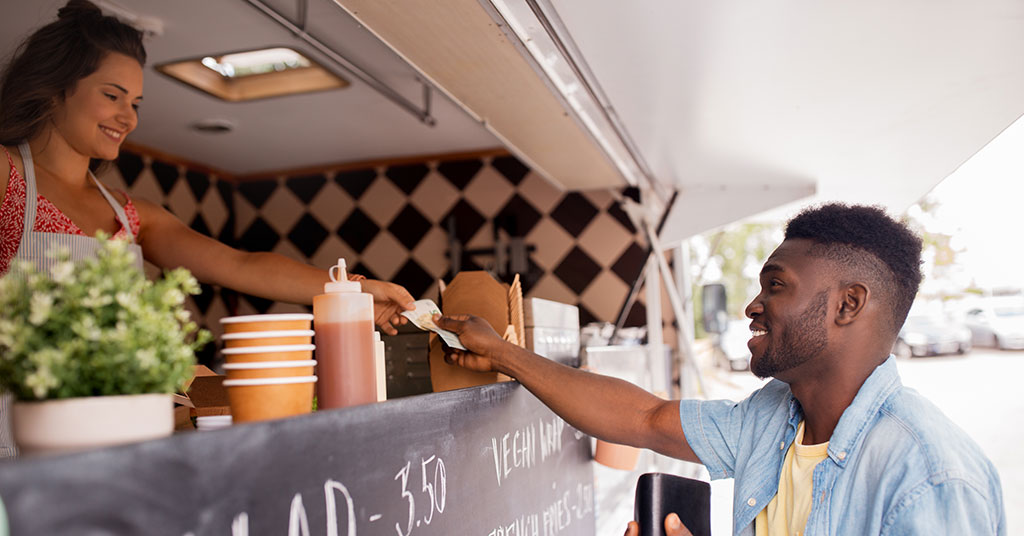The Future of Mobile Food - Using Low-Cost Carts To Expand Your Brand

It's no big secret that the restaurant industry is rapidly changing. The industry as a whole is adapting to a new era of technology, innovation, and consumer expectations - including an increasing demand in the quality and convenience of their food.
From vendors selling hot dogs on the streets of New York City to food trucks across the nation, mobile food has been in hot demand for decades. The billion-dollar industry that is food trucks was made popular after the Great Recession, as it was a cheaper alternative for independent entrepreneurs looking to bring their product to the masses.
However, Americans have been selling food from wheels for more than a century. The appeal has been obvious: mobile food platforms generally have lower overhead, need fewer employees, and have the flexibility to move from one location to another. Food truck operators have historically used their trucks to test their concept before committing to traditional brick-and-mortar stores, with their associated costs and commitments.
Brands can use mobile trucks and carts as a low-cost platform to test new products, gather real-time feedback, and generate social media engagement before official launches of products in markets. The flexibility that mobile food provides an entrepreneur can be used in many different ways to meet - or test - consumer needs and wants.
Interestingly, while 70% of consumers have said they would patronize a food cart operated by their favorite restaurant, only 15% of the top 200 restaurant chains operate food trucks, according to the National Restaurant Association. The demand is here, and we're seeing a shift in dynamics where major restaurant brands are now playing catch-up and looking to establish a mobile fleet. With mobile food platforms, brands can serve their customers beyond their brick-and-mortar locations during new construction, remodels, and marketing events.
With retail rents for traditional brick-and-mortar stores continuing to soar in major cities across the United States, many operators do not have the resources to establish a mobile presence. Additionally, competition for ideal footprints in "A" locations has made finding the "perfect" site harder. Most important, however, is that before investing in a mobile cart or truck (or fleet), brands must create an effective strategy around a smart extension into mobile food.
At Move Systems, we are one of several suppliers to choose from when entering the mobile food business. We've simplified and modernized the mobile business model with our turnkey mobile cart, which has helped franchisors including Dunkin' and Nathan's Famous have a cost-efficient, mobile presence. Our mobile platform uses solar energy and rechargeable battery power that allows the cart to roam free or plug in to a city's power grid - and produce less greenhouse gas and smog-causing pollution than traditional food carts or trucks. The flexibility of a smaller food cart also allows brands to set up operations in far more locations, including sidewalks, plazas, park pathways, or even in front of their own brick-and-mortar stores.
Conclusion
To succeed in the mobile food segment, operators must first understand the logistics of a hub-and-spoke strategy and how to bring their menu into a quick-serve format that makes their mobile food cart an extension of their brick-and-mortar locations. They also need to holistically examine locations for their mobile kitchen; navigate the permitting process on a county-by-county and city-by-city basis; choose the right menu combination that increases throughput and meets customer demand; and employ the right marketing strategy and tactics, using the mobile cart itself as a branding tool to attract customers.
Ultimately, brands that are committed to innovation and customer experience are going to thrive and obtain customer loyalty and long-term success.
James Meeks is CEO of Move Systems, which has built and operated more than 65 mobile restaurants in New York City, and is now expanding to help franchisees across the country go mobile. Visit www.movesystems.com to learn more.
Share this Feature
Recommended Reading:
| ADVERTISE | SPONSORED CONTENT |
FRANCHISE TOPICS
- Multi-Unit Franchising
- Get Started in Franchising
- Franchise Growth
- Franchise Operations
- Open New Units
- Franchise Leadership
- Franchise Marketing
- Technology
- Franchise Law
- Franchise Awards
- Franchise Rankings
- Franchise Trends
- Franchise Development
- Featured Franchise Stories
| ADVERTISE | SPONSORED CONTENT |








 The franchise listed above are not related to or endorsed by Franchise Update or Franchise Update Media Group. We are not engaged in, supporting, or endorsing any specific franchise, business opportunity, company or individual. No statement in this site is to be construed as a recommendation. We encourage prospective franchise buyers to perform extensive due diligence when considering a franchise opportunity.
The franchise listed above are not related to or endorsed by Franchise Update or Franchise Update Media Group. We are not engaged in, supporting, or endorsing any specific franchise, business opportunity, company or individual. No statement in this site is to be construed as a recommendation. We encourage prospective franchise buyers to perform extensive due diligence when considering a franchise opportunity.